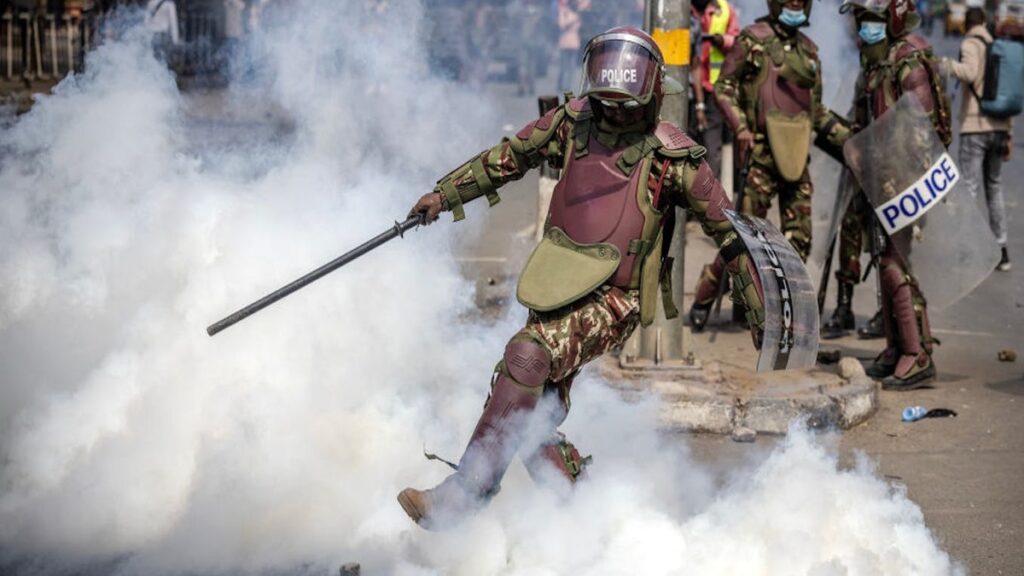In a significant diplomatic move, US Secretary of State Antony Blinken has directly confronted Kenyan President William Ruto about mounting concerns over police violence during recent protests in the East African nation.

Kenyan Police during an earlier riot; Courtesy Photo
The high-level intervention came after reports of widespread police brutality left over 41 people dead and more than 300 injured during demonstrations against the controversial Finance Bill 2024.
Blinken’s telephone conversation with President Ruto highlighted growing international concern about the handling of public protests by Kenyan security forces. The US Secretary of State urged immediate action to prevent further violence and ensure accountability for past incidents.
“Security forces must show restraint when dealing with protesters,” Blinken emphasised during the call. His direct approach marks a notable shift in diplomatic relations between the two nations.
The protests, which rocked several Kenyan cities, initially began as peaceful demonstrations against proposed tax increases in the Finance Bill 2024. However, they quickly turned violent when police clashed with demonstrators.
Law enforcement officials arrested 50 people during the unrest. The heavy-handed response drew criticism from human rights organisations and the international community.
President Ruto, responding to mounting pressure both domestically and internationally, has pledged to investigate allegations of police misconduct. The Kenyan leader assured Blinken that his government would hold accountable any security personnel involved in protest violence or disappearances.
“We take these allegations seriously,” a spokesperson for the Kenyan government said. “Our commitment to human rights and constitutional freedoms remains unwavering.”
The US diplomatic intervention specifically addressed three key areas of concern. First, Blinken stressed the fundamental importance of protecting freedom of assembly and expression, rights guaranteed by Kenya’s constitution.
Secondly, he highlighted the crucial role of youth and civil society organisations in building healthy democracies. The Secretary of State urged Kenyan authorities to respect and protect these groups’ contributions to national development.
Thirdly, Blinken called for immediate measures to reduce tensions between security forces and protesters. His recommendations included improved training for police officers and stricter oversight of crowd control operations.
The impact of the protests has reverberated throughout Kenya’s political landscape. President Ruto, facing intense public backlash, ultimately decided not to sign the controversial Finance Bill. Instead, he returned it to Parliament with his reservations, marking a significant victory for protesters.
Despite raising these serious concerns, Blinken reaffirmed America’s commitment to supporting Kenya. He assured President Ruto that the United States would continue to partner with Kenya in addressing its economic challenges.
“Our relationship with Kenya remains strong,” Blinken stated. “We stand ready to help our partners navigate difficult times while upholding democratic principles.”
The US intervention reflects growing international scrutiny of police conduct in Kenya. Human rights organisations have documented numerous cases of excessive force during protests, leading to calls for comprehensive police reform.
Dr James Mwangi, a political analyst at the University of Nairobi, sees the US involvement as a watershed moment. “This direct intervention by Secretary Blinken shows that the international community will not turn a blind eye to human rights violations, even when committed by strategic partners,” he explained.
The telephone conversation has sparked renewed debate about police reform in Kenya. Civil society groups have called for immediate implementation of existing police oversight mechanisms and better training for security forces.
“We need systematic changes in how our police handle protests,” said Sarah Kimani, director of the Kenya Human Rights Commission. “The current approach clearly violates both our constitution and international human rights standards.”
Looking ahead, President Ruto’s administration faces the challenge of balancing security concerns with constitutional rights. The government must also address the underlying economic issues that sparked the protests while maintaining public order.
International observers will closely monitor Kenya’s response to these concerns. The US State Department has indicated it will continue to track developments and may consider further diplomatic measures if necessary.
The incident highlights the delicate balance between maintaining law and order and protecting civil liberties. It also demonstrates the growing role of international diplomacy in promoting human rights and democratic values across Africa.
As Kenya moves forward, the government’s handling of future protests and its commitment to police reform will test President Ruto’s pledges to Secretary Blinken. The world watches as this East African nation grapples with these crucial challenges to its democratic development.



















